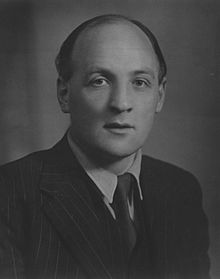Evan Durbin
| Evan Durbin | |
|---|---|

Evan Durbin, c. 1930s
|
|
| Born |
1 March 1906 Bideford |
| Died | 3 September 1948 (aged 42) Crackington Haven |
| Nationality | United Kingdom |
| Institution | London School of Economics |
| Field | Macroeconomics |
| School or tradition |
Market socialism |
| Alma mater |
New College, Oxford, Taunton School, Hele's School, Exeter |
| Influences | Lionel Robbins, Reginald Bassett, G. D. H. Cole, R. H. Tawney, James Meade, John Bowlby, Solly Zuckerman, Susan Isaacs |
Evan Frank Mottram Durbin (1 March 1906 – 3 September 1948) was a British economist and left-wing politician, whose writings combined a belief in central economic planning with a conviction that the price mechanism of markets was indispensable.
The historian David Kynaston has described Durbin as 'the Labour Party's most interesting thinker of the 1940s and arguably of the twentieth century'.
Durbin was born in 1906, the son of a Baptist minister. He was educated at Plympton and Exmouth Elementary Schools; Heles School, Exeter; Taunton School; and New College, Oxford. At Oxford he studied zoology, followed by PPE, and became one of what Ben Pimlott described as 'the "Cole group" of distinguished young socialists'. He befriended Hugh Gaitskell (later, leader of the Labour Party 1955–63) during the General Strike of 1926, when he undertook public speaking tasks on behalf of the strikers in and around Oxford, and Gaitskell acted as his driver. In 1929, he was awarded a Ricardo scholarship to study economics at University College, London, where Gaitskell was already on the teaching staff and their friendship, which lasted until Durbin's death, cemented itself.
In autumn 1930 he was appointed to a lectureship in economics at the London School of Economics (LSE), where he remained until 1940. Lecturer and Senior Lecturer in Economics, London School of Economics, 1930–1945.
Politically, Durbin defined himself as a 'militant Moderate'.
In 1931 he was an unsuccessful Parliamentary candidate (Labour) for East Grinstead, where Gaitskell spoke for him, addressing a meeting which included 'rowdy but good-natured Tory opposition', and in 1935 he stood for Gillingham, Kent, where, in his selection speech, Durbin famously prioritised the preservation of political democracy over the pursuit of both socialism and peace.
In early 1939 he joined with Douglas Jay and Hugh Gaitskell in urging the Labour Party leadership to agree to the government's proposal for military conscription, so long as there was a quid pro quo in the form of '"conscription of wealth" (a wealth tax). Instead, the Labour Party refused to support conscription at all. Once war was declared, Durbin was temporarily seconded to the Economic Section of the War Cabinet Secretariat, with other notable economists such as Lionel Robbins and the young Harold Wilson, 1940–1942 (during which time he penned The Politics of Democratic Socialism, described by Professor David Marquand as consummating "[t]he marriage between Keynsianism and Fabianism"); and then was temporary Personal Assistant to Clement Attlee, Deputy Prime Minister, 1942–1945.
...
Wikipedia
